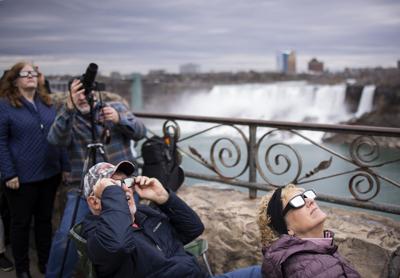Staring into the sun for a set period at certain times of day can provide ocular and general health benefits, some social media users claimed on various platforms. These claims are misleading. Eye doctors say the practice of "sungazing" could cause irreversible damage to the eye, and other health benefits from the sun can be achieved without risking loss of sight.Â
THE CLAIM
With summer solstice less than a month away, Canadians are looking forward to a sunnier and warmer-than-normal ²õ±ð²¹²õ´Ç²Ô.Ìý
While most people might plan to enjoy the sunshine in moderation, there are some who take an uncommon approach to get their sun — with potentially dangerous consequences.Â
Those who practice "sungazing" — the act of staring directly into the sun for extended periods — claim it provides a plethora of health benefits.
Social media sungazers on platforms like TikTok and Instagram share the supposed benefits with their audiences in videos garnering hundreds of thousands of views.Â
"Do you know you can harvest the energy of the sun using your eyes?" one TikTok user asked with more than 100,000 plays.Â
He claimed looking directly into the sun during sunrise and sunset could improve eyesight, activate the brain's pineal gland (which produces the sleep hormone melatonin) and boost one's mood.Â
The user recommended sungazers "cleanse" their eyes before the practice by washing with a mix of eyebright herbs and sulphur water.Â
Another TikToker claimed the optimal time to stare into the sun was sunrise or about 30 minutes before sunset, and about sungazing's benefits toward energy, sleep quality and eyesight.Â
"You can look into the sun without harming your eyes," one sungazing practitioner , in a video with more than 260,000 views.
RATING: Misleading
According to the Canadian Ophthalmological Society, a national body representing more than 1,000 eye doctors, can be dangerous.Â
Staring directly at the sun can be risky because its ultraviolet (UV) rays hit the centre of the , the layer of photoreceptor cells at the back of the eye that tell our brains what we're looking at.
The UV rays get converted to unstable molecules that destroy photoreceptors and damage tissue of the central retina in an area called the macula.Â
The resulting damage is called , which is commonly associated with sungazing or eclipse viewing.Â
Symptoms of solar retinopathy include blurry vision, eye pain and loss of sight in the centre of one's vision.Â
"Sometimes it's temporary, but often times it can be permanent, and that can lead to very significant central visual field changes or even central vision loss," said , chief of ophthalmology at Sunnybrook Health Sciences Centre in Toronto.
"There's no effective treatment for solar retinopathy," he said.Â
Many sungazers view sunrise or sunset as the ideal time to look directly at the sun, claiming it's safer for the eyes.Â
While UV radiation from the sun , that doesn't mean there's zero risk to looking directly at the sun, or that it improves eyesight as some social media users claimed.Â
"Staring at the sun does not have any direct ocular benefits," Eng said.Â
Although looking directly at the sun doesn't provide eye health benefits, there is evidence sunlight could be beneficial to children's eye health in certain contexts.Â
, comprehensive ophthalmologist at University Health Network's Donald K. Johnson Eye Institute in Toronto, said eye doctors encourage outdoor play in natural light for children with myopia, or nearsightedness.Â
That's because spending time in outdoor light could help prevent the development of myopia among children.Â
"But that's not looking directly into the sun … (sungazing) could potentially be harmful, very harmful," Sit said.Â
As for the claim about using eyebright herbs and sulphur water to "cleanse" the eyes before sungazing, neither eye doctor was familiar with the herb or any potential benefits to eye health, and Sit cautioned against using products that aren't regulated or proven effective for the eyes.Â
While it's true that and offers health benefits like improved mood and energy, these benefits can be derived through healthy sun exposure without staring at the sun, both Sit and Eng said.Â
Both doctors said there aren't any lasting health benefits to sungazing, and any perceived rewards are outweighed by potential risks to one's eyesight.Â
"Including damaging it permanently," Sit said.Â
SOURCES
Jordan Omstead. Warm summer in the forecast as droughts and wildfire risks loom: Weather Network. °µÍø½ûÇø website. May 28, 2025 ()
Nicole Ireland. Melanoma is on the rise and young people aren't using enough sunscreen, doctors say. °µÍø½ûÇø website. May 16, 2025 ()
Claims about benefits of sungazing from TikTok (), () and Instagram (, )
Protect Your Vision: Safeguarding Canadians During the Total Solar Eclipse on April 8. Canadian Ophthalmological Society press release via . March 21, 2024 ()
Retina. Cleveland Clinic . Accessed May 29, 2025 ()
Solar Retinopathy. EyeWiki via American Academy of Ophthalmology . Feb. 26, 2025 ()
. Chief of ophthalmology at Sunnybrook Health Sciences Centre in Toronto. Interviewed May 29, 2025 ()
When is the sun strongest? European Code Against Cancer via International Agency for Research on Cancer . Accessed May 29, 2025 ()
, Comprehensive Ophthalmologist at University Health Network's Donald K. Johnson Eye Institute in Toronto. Interviewed May 29, 2025 ()
Rohit Dhakal et al. Time spent outdoors as an intervention for myopia prevention and control in children: an overview of systematic reviews. Ophthalmic and Physiological Optics journal via National Library of Medicine . Jan. 24, 2022 ()Ìý
M Nathaniel Mead. Benefits of Sunlight: A Bright Spot for Human Health. °µÍø½ûÇøal Health Perspectives journal via National Library of Medicine . April 2008 ()
ABOUT CANADIAN PRESS FACT CHECKS
You can find out more about °µÍø½ûÇø here and about Canadian Press Fact Checks here. To reach our fact-checking team with any tips, corrections or comments, please email us at cpfactcheck@thecanadianpress.com.






































